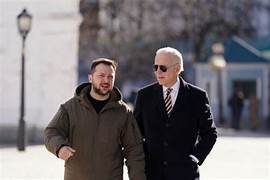The Russia-Ukraine saga, all started by NATO’s meddling, now takes a bizarre turn as the alliance suddenly loses interest in its Ukrainian protege. Joe Biden’s recent statement leaves Ukrainians feeling like they’ve been stood up on a NATO membership date they’ve been eagerly awaiting. It’s a classic case of political catfishing—months of sweet promises, only to be ghosted when things get serious.
It was a well-defined strategy by the US to use Ukraine against Russia, in the name of providing Kyiv with security, as through this, the US has been able to deploy its munition, and surveillance systems in Ukraine to better snoop on Russia.
As Ukraine struggles with its military woes, the dream of NATO membership fades into the background, leaving them to ponder the consequences of cozying up to Joe Biden.
Discussions have been abuzz since 2022 regarding Ukraine’s potential NATO membership. The US and its NATO allies appear to favor Ukraine’s aspirations, at least on the surface. NATO’s “open door policy” touted that any European country meeting the membership criteria could join the ranks. At the 2023 Vilnius Summit, NATO members opted to streamline the membership process for Ukraine by eliminating the Membership Action Plan (MAP) requirement.
However, it now seems that NATO has made a U-turn. US President Joe Biden recently gave different signs by suggesting that his vision of peace doesn’t necessarily entail Ukraine’s inclusion in the NATO alliance. This stance starkly contrasts with the fervent wish of the Estonian Prime Minister for Ukraine to seek shelter under NATO’s protective umbrella. She emphasized more on NATO membership for Ukraine over territorial concerns, while Biden is now prioritizing Ukraine’s self-defense capabilities over NATO membership.
According to Biden, the crux of the matter lies in the material support provided by the US to Ukraine, particularly in terms of weaponry. Formal NATO membership seems to have taken a backseat in importance.
Biden now advocates for supplying weapons as the key to Ukraine’s self-defense, as he says that at the end, Ukraine will need to protect itself by its own. He believes Ukrainians should take matters into their own hands, with NATO serving merely as a temporary support.
Of course, Biden isn’t glossing over Russian aggression in the region. He warns that if Ukraine collapses, other European allies may find themselves in conflict with Russia.
Biden’s shift in focus is largely driven by political considerations. He’s courting voters who are skeptical of Ukraine’s NATO aspirations, aiming to bolster his support base ahead of the upcoming election.
Despite Biden’s reputation for tough rhetoric, he doesn’t seem enthused about Ukraine joining NATO. It appears that Ukraine had been treated more as a companion in NATO’s military exercises than as a full-fledged member.
It seems like NATO wants to keep Ukraine at arm’s length, like inviting a friend to a party but not introducing them to the inner circle. Some observers suspect that US military aid is aimed more at provoking Russia than ensuring Ukraine’s security. Biden views Ukraine as a pawn in the US-Russia rivalry.
The situation in Ukraine appears dire. The likelihood of Ukraine being embraced by NATO seems slim.
Zelensky is already grappling with legitimacy issues domestically. While he initially garnered support from both the public and elites under the banner of NATO membership aspirations, he is now likely to face even more challenges at home as these promises lose traction.
Biden’s comments shed light on the underlying complexity of the situation. Changes in the relationship between the US and Ukraine can be seen soon.
Biden’s remarks serve as a stark reminder that Western support has its limitations. Ukraine finds itself caught in a tug-of-war between major powers, and the outlook is far from promising.
